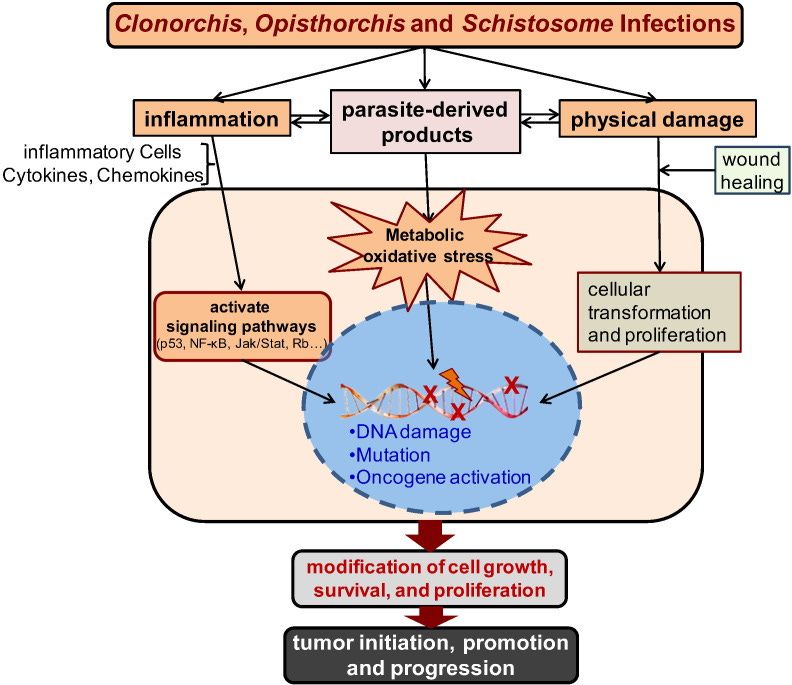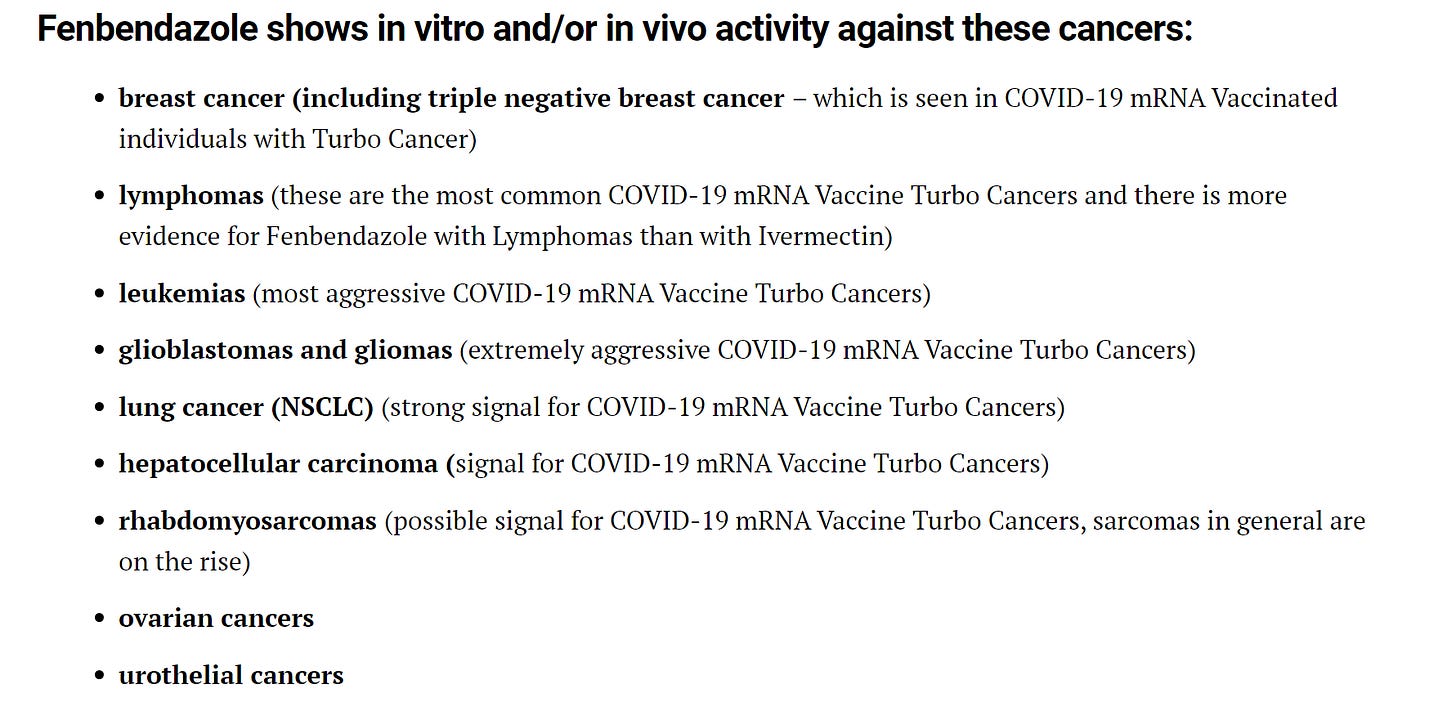As a compendium to my previous substack on cancer, I offer you a brief overview of the theory that cancer is parasitic in origin. Ultimately I believe theory may apply in some cases but not all. Further, since everything big pharma and mainstream medicine summarily dismisses this theory I think it should be formally studied and proved or disproved so we know. This is not intended to be a comprehensive detailing, it’s simply an introduction. Affording thereto, it’s not possible to cover every expert so if I didn’t include something you believe is relevant - leave me a comment below.
In the mainstream, parasite infection is a commonly disregarded cancer risk factor even though research shows a feasible link between parasites and the development of cancer. Despite the relationship between parasites and other disease, including cancer this theory is often dismissed by ‘big medicine’. Some experts speculate that the reason for this rebuff is clear: money. Simply put, there is no money to be made in a medical system that exists in a parasite paradigm versus a ‘virus’ paradigm. Anti-parasitic medications like Ivermectin and Fenbendazole are pennies on the dollar compared to costly alternatives like chemotherapy and radiation. One treatment option buys the doctor a summer home - while the other does not. The financial incentives to keep such a revelation from being endorsed -or even acknowledged by the system is in the billions, if not more. Their entire industry could topple if people were to learn that the source of their disease could be so simple.
The Center for Disease Controls defines parasite as “an organism that lives on or in a host organism and gets its food from or at the expense of its host. They thrive off of foods such as dairy products, sugar and protein. They list three main classes of parasites that can cause disease in humans: protozoa, helminths, and ectoparasites.
Cancer is characterized by the unchecked growth of aberrant and altered cells that have the capacity to invade nearby tissues. Which, according to some experts is exactly what some parasites do within the body.
Dr. Lee Merritt has served on the Board of the Arizona Medical Association and is a past president of the Association of American Physicians and Surgeons (AAPS). She proposes, in the simplest way I can summarize it - that parasites in the body slowly increase in number over a lifetime and that they can lay thousands, upon thousands of eggs a day and form intracellular cysts. As more cysts present themselves it takes more of your immune system to keep them in check. The more active the immune system, the more likely you are to experience autoimmune disease. She postulates that when their numbers get too many, when these microscopic invaders are out of control and egg sacs enlarge and invade nearby tissues- this is when we see metastasis. Metastasis is when cancer has spread to a different part of the body part than where it started. Cancer spreads this way via the lymphatic system and it’s plausible to picture these invaders traveling throughout the body wreaking havoc.
In 1890 Scottish microbiologist and pathologist William Russell reported finding parasitic spores within cancer cells. He published his findings in the British Medical Journal and went on to formulate a comprehensive hypothesis explaining how cancer is a parasitic disease. As previously mentioned, these theories have routinely been dismissed within the medical community which remains steadfast in the ‘virus’ paradigm.
I recommend you read ‘How Parasites Get Their Hooks into Human Cells’, published by the Whitehead Institute for biomedical research. It explains the chain of cellular events that see parasites replicate and travel within cells and how other factors like calcium play a role.
“Whitehead Institute Member Sebastian Lourido studies apicomplexan biology using the species Toxoplasma gondii (T. gondii), which causes toxoplasmosis, a disease that can be deadly in people with compromised immune systems.
Active T. gondii parasites transition between two modes: replicating inside of one host cell and spreading to new cells. The transition between these modes happens very quickly: parasites will be busy replicating and then will rapidly exit the host cell and travel to new cells to invade them. Once inside a new cell, the parasites can switch back to reproducing or enter into a chronic stage—a hardy, inert form that can hide from the host’s immune system indefinitely.
Researchers knew that T. gondii starts its transition from the reproductive to the spreading mode with a calcium signal within the parasite. Calcium is an important signal that many cells use to trigger the quick release of different molecules, such as neurotransmitters from neurons and insulin from pancreatic cells in humans. In T. gondii, calcium is the signal that triggers release of molecules parasites need to exit host cells, travel, and invade. These include molecules to make the host cell membrane permeable and sticky molecules that the parasite uses to attach to and glide along host tissue, enabling it to move in the environment outside of the host cell. These molecules are packaged in small membrane-bound containers called micronemes, hundreds of which are scattered throughout the front third of the parasite cell.
The calcium signal begins a chain of signaling, like a game of telephone, that ultimately triggers the parasite cell to release the contents of these microneme packages. The cell does this by attaching the packages to a cellular conveyor belt system that runs along microtubules, part of the cytoskeleton. This whizzes them to the very front of the parasite, where their contents can be released outside of the parasite through a process called exocytosis, in which the membrane of the package fuses with the membrane of the parasite cell.”
A review published in Science Direct “Helminths in Human Carcinogenesis" reveals the following:
“Johanes Fibiger won the only Nobel Prize for helminthology in 1926 for the induction of gastric cancer in rats by feeding them cockroaches infected with Spiroptera neoplastica larvae (Campbell, 1997). The idea of parasitic worms causing cancer was not new. Fibiger had been aware of the causal relationship of Schistosoma haematobium and human urinary bladder cancer. His dissection of wild rats had yielded remarkable finding—stomach tumours containing worms.
Fibiger's worm, S. neoplastica (later renamed Gongylonema neoplastica), provided a unique scientific tool for the experimental induction of cancer in mammalian hosts. Fibiger's work was later criticized for the gastric tumours not being true cancers, but merely worm‐induced hyperplasia associated with vitamin A deficiency. Today, the International Agency for Research on Cancer (IARC) has in part vindicated Fibiger's belief in parasite‐induced cancer by labelling S. haematobium and Opisthorchis viverrini as definitely carcinogenic (group 1) and Clonorchis sinensis as probably carcinogenic (group 2) to humans (IARC, 1994).”
In November 2015, a study published in the New England Journal of Medicine called ‘Malignant Transformation of Hymenolepis nana in a Human Host’, revealed a shocking case in which cancer developed into a different kind of infectious parasite as a result of a tapeworm infection. Researchers found tapeworm DNA in the cancer cells when they looked at the immunocompromised patient's lymph node tissue.
“The problem of proving the role of parasites in cancer induction is difficult because of their complex natural histories and long asymptomatic latent periods during which numerous endogenous and exogenous factors can interact to obfuscate causality.”
Herrera and Ostrosky‐Wegman, 2001
If you’re thinking it’s only as deep as ‘people with compromised immune systems are just more susceptible to parasites’ - that’s fair. After all, correlation does not necessarily equal causation, however, it has been demonstrated that the tick-borne parasite T. parva creates a disease that is almost exactly like lymphoma, and that inoculating mice with the C. parvum parasite causes colon cancer abruptly.
Additionally, the “Helminths in Human Carcinogenesis" reveals the following:
“The International Agency for Research on Cancer (IARC) considered three species of trematodes, Schistosoma haematobium, Opisthorchis viverrini and Clonorchis sinensis, responsible for helminth induced human cancer; they considered S. haematobium and O. viverrini as group 1 carcinogens and C. sinensis as a group 2 carcinogen [2].
Helminth infections are of great importance globally with countless millions of humans being infected or at risk of infection. Mathematical models have been used to calculate the risk of cancer due to infection; the calculated risk factor indicates that about 15% of all cases globally can be attributed to infections including those due to schistosomes and liver flukes. The infectious origin of a cancer implies that it is preventable. Therefore, if infections were prevented by increased educational efforts and improved public health initiatives, there would be considerably fewer cases of cancer in both developed and underdeveloped countries.”
“Among parasitic diseases, infections with the two fish-borne liver flukes of the family Opisthorchiidae (trematodes), specifically Opisthorchis viverrini and Clonorchis sinensis, can induce cholangiocarcinoma, and infection with the blood fluke Schistosoma haematobium may cause cancer of the urinary bladder (Bouvard et al., 2009).”
Knowing this, it’s not a stretch to come to the conclusion that ridding the body of parasites could effectively prevent or treat some cancer. Many of us have heard about the Joe Tippens Protocol, where a man allegedly cured his late-stage cancer with an inexpensive veterinary product, a de-wormer called Fenbendazole. Experts like Dr. Bryan Ardis have weighed in on the discussion and concluded that anti parasitic drugs are an effective treatment with a documented history of success. He explains that approximately 50% of the cancerous tumors/polyps he saw with his patients had been misdiagnosed and were actually parasitic egg sacs. He indicated that 70% of autoimmune cases seen in his practice - were caused by parasites.
In a 2021 Johns Hopkins study published in the journal Oncotarget on July 6, Gregory Riggins, M.D., Ph.D., professor of neurosurgery and oncology at the Johns Hopkins University School of Medicine, and his team ‘used two different mouse models to determine that the anti-parasitic drug mebendazole could slow or stop the growth and spread of both early and late-stage pancreatic cancer. Riggins and his team administered mebendazole to mice that were genetically engineered to develop pancreatic cancer’. Read that again: they genetically manipulated them to develop cancer.
Riggins concluded: “We think that mebendazole could have a role in all stages. It was particularly effective for pancreatic cancer that was detected early.”
Oncologist Dr. William Makis has compiled data that shows that ‘Fenbendazole has at least 12 proven anti-cancer mechanisms in vitro and in vivo’. I encourage you to read his article where he goes in depth on each of the studies that support the following conclusions of anti-cancer mechanisms.
There is evidence to suggest that anti-parasitic medications treat the following cancers:
I will tell you simply that I do not believe that anything here conclusively proves that all cancer is parasitic but the questions are fair and legitimate. I also do not believe that FenBen, Ivermectin or anything else will be the magic pill that cures everything we call cancer. That said, the parasite hypothesis deserves legitimate and unbiased research and while I may not believe those two drugs will cure all cancer I absolutely believe they could have a therapeutic role and potentially cure some cancers. Ultimately I think it is fair to ask whether anti-parasitic drugs are showing promise in fighting some cancer because the cancer is a result of parasites or if it is because the cancer is susceptible to treatments for parasites.
Ultimately anti parasitic drugs should investigated to determine if and how they should be included in the treatment of cancer. Fenbendazole is just ONE of the drugs in this class with others like Ivermectin proving to be equally as promising. The real question is, will Big Pharma or our crooked government ever legitimately investigate this?
"They know that Cancer is Parasites, but they're not letting anyone know because they don't want to lose their funding."
Dr. Lee Merritt
Sources:
Parasites that Can Lead to Cancer | American Cancer Society | American Cancer Society
The Overlooked Miracle Drug for Cancer? Why Big Pharma Fears Fenbendazole – Vigilant News Network
Joe Tippins' Fenbendazole Protocol For Cancer (deeprootsathome.com)
https://rumble.com/v499vvf-parasites-the-cause-of-cancer-and-covid.html
https://rumble.com/v493ooo-dr-lee-merritt-on-cancers-and-darpa-mind-control.html
https://yournews.com/2023/08/24/2628420/dr-lee-merritt-cancer-tumors-are-parasites/
Parasites: Types, Symptoms, Treatment & Prevention (clevelandclinic.org)
How Parasite Infection Can Lead to Cancer (naturalmentor.com)
Parasite-Derived Cancer | New England Journal of Medicine (nejm.org)
Cancer: An Unbiased Overview In Preparation for Our Upcoming War On Cancer (substack.com)
Parasite-microbe-host interactions and cancer risk | PLOS Pathogens
Antiparasitic Drugs: Malaria, Toxoplasmosis, Parasitic Infection (clevelandclinic.org)
How parasites get their HOOKs into human cells | Whitehead Institute (mit.edu)
Project MUSE - The Worm and the Tumor: Reflections on Fibiger's Nobel Prize (jhu.edu)
Donate at ForGodFamilyCountry.org
Support Ethical Lawfare
Charitable Work In Litigation, Education & Fighting for Change.
Join Us To Raise $3 Million To Fight Against Cancer, Corruption, and Human Trafficking
Your donations support Renz's ethical lawfare in areas like health freedom, cancer corruption, MAGA education, and fighting for freedom and justice.
Our Areas of Impact:
Our efforts and funding are directed towards four primary areas:
Advocacy for Freedom and Health: We will file or support health freedom lawsuits and educate about the truth of your health. Whether standing against unhealthy food or big pharma corruption this is core to our beliefs.
Legal Support: We provide assistance in legal matters pertaining to freedom, health freedom, and healthcare, and corruption. We may litigate or support appropriate and related litigation.
Cancer Research: The cancer industry is corrupt. While there are many good people working to fight cancer, the industry is broken. We will be working to educate and fight for changes to the cancer industry in every way possible.
Support Services: We are here to help people. Our organization do everything we can to extend aid to individuals confronted with cancer, as well as those engaged in battles for freedom or health freedom, alongside addressing miscellaneous issues aligned with our mission.















What are cancer rates like in countries where deworming occurs often? I think even Aussies deworm at least for pinworms since pinworms seem common there.
Great info.
A must read.
Explains why repurposed drugs like IVERMECTIN are invaluable.
IVM should be over the counter given it's fantastic safety profile.
Equally Mebendazole too, as it has been over the counter in many European countries.
Humanity must learn to doctor ourselves , given that we can no longer trust most physicians.
Dr. Lee Merritt is truly brilliant and we all should follow her excellent advice.